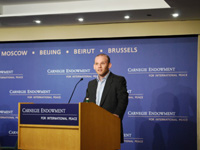Registration
You will receive an email confirming your registration.
IMGXYZ2544IMGZYXThroughout the 1960s, Israel covertly developed its nuclear weapons program. In the following decade, apartheid South Africa sought to emulate Israel by pursuing its own clandestine nuclear capability. The two countries began to cooperate closely after the 1973 Yom Kippur War between Israel and a number of its Arab neighbors; they exchanged uranium, tritium, and numerous nuclear scientists and ballistic missile experts, allowing Israel to expand its nuclear arsenal and helping South Africa join the nuclear club. Sasha Polakow-Suransky, author of The Unspoken Alliance: Israel's Secret Relationship with Apartheid South Africa, joined Avner Cohen in Washington for a discussion on the history of Israeli-South African nuclear cooperation and the future of Israel's nuclear posture. Carnegie’s Thomas Carothers moderated.
The Transaction that Wasn’t
Recently, an article in the Guardian alleged that Polakow-Suransky’s research reveals an Israeli offer to sell nuclear weapons to South Africa. The historical record is much more ambiguous, Polakow-Suransky said.
- While several South African officials advocated purchasing nuclear-tipped Israeli Jericho missiles, there is no available evidence that Israel made South Africa an explicit offer to sell nuclear weapons.
- In a 1975 meeting, Israeli and South African officials, including then-Israeli Defense Minister Shimon Peres, discussed the possible transfer of Jericho missiles topped with warheads of various “sizes,” which Polakow-Suransky argues suggests that the possibility of transferring unconventional warheads was at least considered.
Was the “Offer” Authorized?
There is substantial debate over whether the 1975 meeting constituted an official offer from Israel to sell nuclear-tipped missiles to South Africa:
- Cohen argued that if the vague references to variously “sized” warheads did indeed refer to nuclear or other unconventional weapons, they probably constituted a “probe” by Defense Minister Peres unauthorized by the Prime Minister or other top officials.
- Peres’s career, Cohen alleged, reveals several instances of foreign policy “adventurism,” which he defines as a tendency to secure informal diplomatic agreement on policies and solutions prior to discussing them with his superiors.
- While Polakow-Suransky sees the 1975 encounter as evidence of an “offer on the table” to transfer Israeli nuclear weapons, Cohen sees it as an unauthorized trial balloon floated by Peres.
- Polakow-Suransky suggested that South Africa declined to follow through with the deal because its own scientists had made progress by the 1980s on an indigenous nuclear capability.
Israeli–South African Relations
- Cohen and Polakow-Suransky both argued that the history of Israeli–South African cooperation should be seen in the context of each country’s persistent anxieties about isolation.
- The zenith of the cooperation between the two countries arrived in the late 1970s, which coincides with a relative chill in relations between Israel and the United States. Similarly, both panelists agreed, as global outrage at South Africa’s apartheid system intensified, South Africa turned to Israel for political, economic, and military support.
- Cohen further argued that the Israeli Defense Forces (IDF) had a parochial interest in encouraging cooperation between the two countries; after the 1973 Arab-Israeli War, the IDF was in need of materiel and money, and South Africa proved to be a lucrative export market for the Israeli defense industry.
